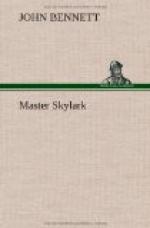THE ADMIRAL’S COMPANY
The ancient city of Coventry stands upon a little hill, with old St. Michael’s steeple and the spire of Holy Trinity church rising above it against the sky; and as the master-player and the boy came climbing upward from the south, walls, towers, chimneys, and red-tiled roofs were turned to gold by the glow of the setting sun.
To Nick it seemed as if a halo overhung the town—a ruddy glory and a wonder bright; for here the Grey Friars of the great monastery had played their holy mysteries and miracle-plays for over a hundred years; here the trade-guilds had held their pageants when the friars’ day was done; here were all the wonders that old men told by winter fires.
People were coming and going through the gates like bees about a hive, and in the distance Nick could hear the sound of many voices, the rush of feet, wheels, and hoofs, and the shrill pipe of music. Here and there were little knots of country folk making holiday: a father and mother with a group of rosy children; a lad and his lass, spruce in new finery, and gay with bits of ribbon—merry groups that were ever changing. Gay banners flapped on tall ash staves. The suburb fields were filled with booths and tents and stalls and butts for archery. The very air seemed eager with the eve of holiday.
But what to Nick was breathless wonder was to Carew only a twice-told tale; so he pushed through the crowded thoroughfares, amid a throng that made Nick’s head spin round, and came quickly to the Blue Boar Inn.
The court was crowded to the gates with horses, travelers, and serving-men; and here and there and everywhere rushed the busy innkeeper, with a linen napkin fluttering on his arm, his cap half off, and in his hot hand a pewter flagon, from which the brown ale dripped in spatters on his fat legs as he flew.
“They’re here,” said Carew, looking shrewdly about; “for there is Gregory Goole, my groom, and Stephen Magelt, the tire-man. In with thee, Nicholas.”
He put Nick before him with a little air of patronage, and pushed him into the room.
It was a large, low chamber with heavy beams overhead, hung with leather jacks and pewter tankards. Around the walls stood rough tables, at which a medley of guests sat eating, drinking, dicing, playing at cards, and talking loudly all at once, while the tapster and the cook’s knave sped wildly about.
At a great table in the midst of the riot sat the Lord High Admiral’s players—a score or more loud-swashing gallants, richly clad in ruffs and bands, embroidered shirts, Italian doublets slashed and laced, Venetian hose, gay velvet caps with jeweled bands, and every man a poniard or a rapier at his hip. Nick felt very much like a little brown sparrow in a flock of gaudy Indian birds.
The board was loaded down with meat and drink, and some of the players were eating with forks, a new trick from the London court, which Nick had never seen before. But all the diners looked up when Carew’s face was recognized, and welcomed him with a deafening shout.




